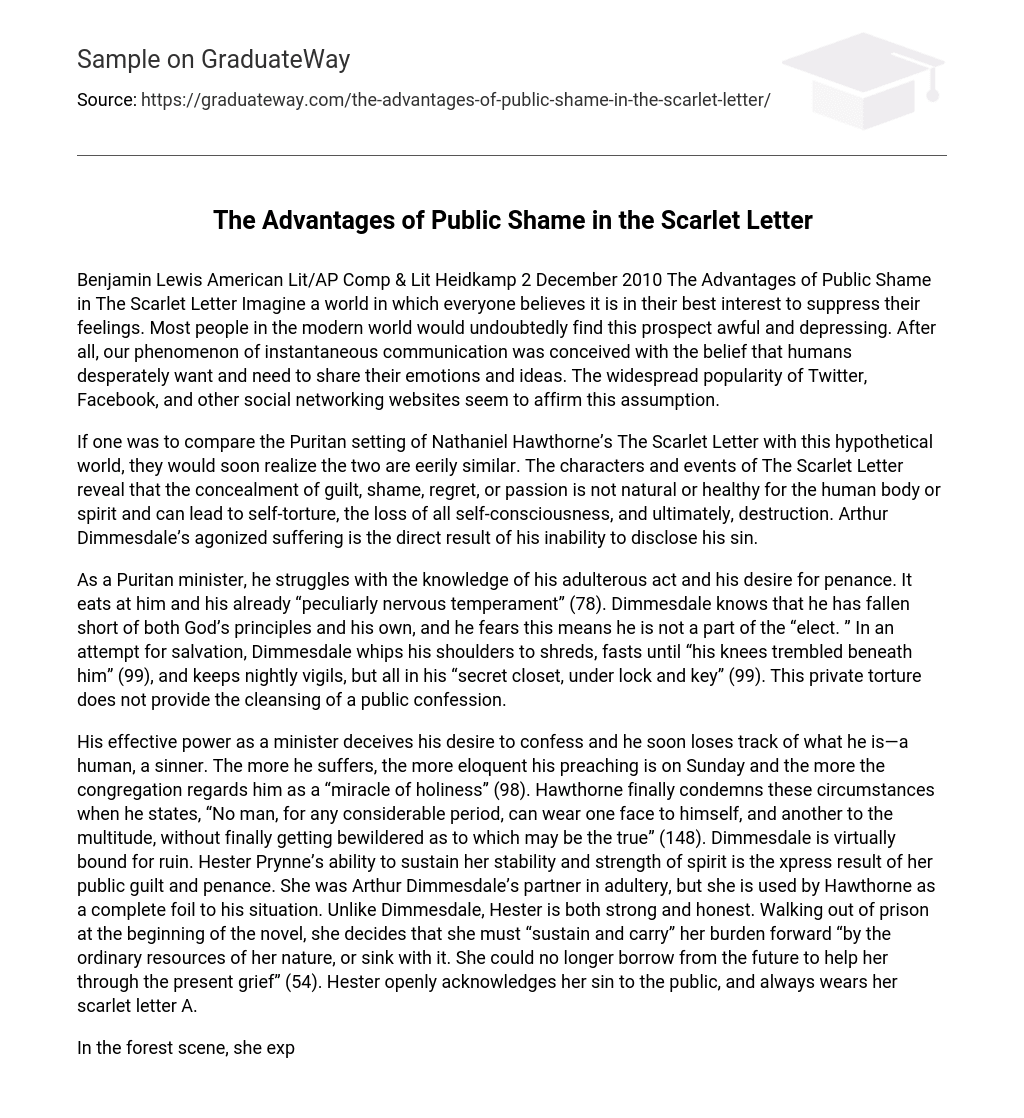Imagine a scenario where every individual thinks it is advantageous for them to hide their emotions. The majority of people in today’s society would certainly perceive this possibility as dreadful and disheartening. After all, our ability to instantly communicate was developed based on the notion that humans have a strong desire and necessity to express their feelings and thoughts. The immense popularity of platforms like Twitter, Facebook, and other social networking sites appear to support this belief.
If we were to compare the Puritan setting of Nathaniel Hawthorne’s The Scarlet Letter with this hypothetical world, we would quickly realize that the two are remarkably alike. The characters and events in The Scarlet Letter demonstrate that hiding guilt, shame, regret, or passion is not normal or beneficial for the mind and body, and can result in self-inflicted suffering, a loss of self-awareness, and ultimately, ruin. Arthur Dimmesdale’s torment is caused directly by his inability to reveal his sin.
As a Puritan minister, Dimmesdale struggles with the guilt of his affair and his desire for redemption. It consumes him, especially given his already “peculiarly nervous temperament” (78). He is aware that he has not lived up to God’s principles or his own, and he worries that this means he is not one of the chosen few. In an effort to find salvation, Dimmesdale punishes himself by whipping his shoulders mercilessly, fasting until he can barely stand, and staying awake through the night in his “secret closet, under lock and key” (99). Unfortunately, this self-inflicted torment does not bring about the purifying effects of a public confession.
The minister’s effective power deceives his desire to confess his sins and he loses sight of his true identity as a human being. Despite his suffering, his preaching on Sunday becomes more eloquent, and the congregation sees him as a holy miracle. Hawthorne ultimately criticizes this situation, stating that no one can maintain different personas without becoming confused about their true self.
Dimmesdale’s inevitable downfall is contrasted by Hester Prynne’s ability to maintain her stability and strength. Hester’s ability to endure is a direct result of her public guilt and penance. Although she was complicit in Arthur Dimmesdale’s adultery, Hawthorne portrays her as completely opposite to his situation. Unlike Dimmesdale, Hester is both resilient and truthful. When she walks out of prison at the beginning of the novel, she resolves to carry her burden forward through her own natural strength or succumb to it. She no longer relies on future resources to help her through her present anguish (54). Hester openly confesses her sins to the public and consistently wears her scarlet letter A.
In the forest scene, Hester tells Dimmesdale that she has been truthful in everything except for confessing his involvement in her pregnancy. She believes that lying is always bad, even if it means facing death. Dimmesdale himself acknowledges that Hester’s situation is healthier than his own. He believes it is better for the sufferer to openly express their pain, like Hester, rather than keeping it hidden inside. Hester’s life of public shame and repentance is bitter, lonely, and challenging, but it allows her to stay true to her identity while Dimmesdale appears to be losing his.
The final scene on the scaffold in The Scarlet Letter, where Dimmesdale undergoes a transformation and ultimately dies, serves to justify and affirm the overall message of the book. Dimmesdale, in a weak and nervous state during the Election Day procession, appears pale as death and struggles to walk. His internal pain and grief have become overwhelming, leading him to finally ascend the scaffold where Hester and Pearl await. Despite battling against physical weakness and a fainting heart, he musters the strength to confess his sin to the people of Boston (174).
By taking this action, it becomes evident to the reader that whether Dimmesdale’s salvation was chosen or earned, it has become a reality. Throughout the story, Dimmesdale had several opportunities to confess his sins but was unsuccessful until this moment. It is important to note that his confession is more aligned with his personal nature rather than his ministerial duties. In this instance, he asks for God’s forgiveness not only for himself, but also for Chillingworth. Chillingworth’s statement of “Thou hast escaped me!… Thou hast escaped me!” confirms the minister’s success (175). The acknowledgment of sin humanizes Dimmesdale and evokes a sense of tragedy and sorrow within the reader upon his eventual death.





